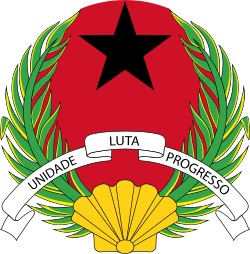Foreign relations of Guinea-Bissau
 |
| This article is part of a series on the politics and government of Guinea-Bissau |
|
|
Legislature |
|
Judiciary
|
The Republic of Guinea-Bissau follows a nonaligned foreign policy and seeks friendly and cooperative relations with a wide variety of states and organizations. France, Portugal, Angola, Brazil, Egypt, Nigeria, Libya, Cuba, the Palestine Liberation Organization, and Russia have diplomatic offices in Bissau.
Bilateral relations
Botswana
Botswana and Guinea-Bissau established diplomatic relations on 22 March 2010.[1]
Cape Verde
The Republic of Cape Verde islands are about 900 km north-west of Guinea-Bissau. Both were colonies of the Portuguese Empire and they campaigned together for independence with a plan for unification, but the countries separated after 1980.[2][3]
China
Guinea
Russia
Guinea-Bissau has an embassy in Moscow, and Russia has an embassy in Bissau.
South Korea
From Guinea-Bissau to the Republic of Korea 1983 June Political and Foreign Affairs Advisor to the President Francisca Vas Turpin 1985 June President Joao Bernardo Vieira 1986 June Minister of National Defense Abdoul Kabele 2011 November Minister of Finance and Economy Nosolini Embalo Minister of Foreign Affairs Pires.[4]
Sweden
United States
The U.S. Embassy suspended operations in Bissau on 14 June 1998, in the midst of violent conflict between forces loyal to then-President Vieira and the military-led junta. Prior to and following the embassy closure, the United States and Guinea-Bissau have enjoyed excellent bilateral relations.
International membership
Guinea-Bissau is a member of several international organizations: the United Nations and many of its specialized and related agencies, including the World Bank, the International Monetary Fund (IMF), the World Health Organization, the Food and Agriculture Organization, the Group of 77, and the International Civil Aviation Organization.
Guinea-Bissau is also a member of the African Development Bank (AFDB), the Economic Community of West African States (ECOWAS), the West African Economic and Monetary Union (WAEMU), the Organisation of Islamic Cooperation (OIC), the African Union (AU), and the permanent Interstate Committee for drought control in the Sahel (CILSS).
See also
References
- ↑ "Botswana establishes relations with Samoa, Guinea Bissau" 30 March 2010 Link retrieved 1 April 2010.
- ↑ MacQueen, Norrie (February 1, 2006). "Widening trajectories: Guinea Bissau and Cape Verde since independence". Relações Internacionais. Retrieved October 29, 2015.
- ↑ Mendy, Peter Karibe; Lobban, Jr., Richard A. (October 17, 2013). "Cape Verde, Relations with". Historical Dictionary of the Republic of Guinea-Bissau. Scarecrow Press. Retrieved October 29, 2015.
- ↑ http://www.mofa.go.kr/ENG/countries/middleeast/countries/20070804/1_24493.jsp?menu=m_30_50